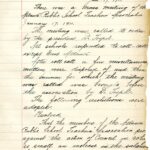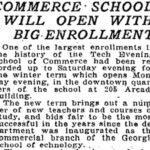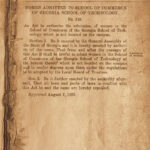Admission of Women to the Evening School of Commerce
Georgia State traces its origins to day and nighttime commerce classes on the all-male Georgia Tech campus. The night classes attracted older students seeking continuing education opportunities to enhance their established careers in downtown Atlanta businesses. By 1914 a number of evening school classes moved downtown to better serve these young men, and this location became Georgia State. When the first Tech commerce students graduated in 1916 with Bachelor of Commercial Science (B.C.S.) degrees, all seven had full-time jobs.
At the time, male and female students in Georgia’s public colleges were educated separately. Women had worked for admission to the University of Georgia (UGA) since the 1890s, but it wasn’t until June 1916 that UGA’s Board of Trustees approved co-education—in graduate programs only. Elsewhere in the nation, advocates in the women’s rights and suffragist movements were making more substantial progress toward coeducation in public schools. In September 1917, though, five months after the U.S. entered World War I, Tech Dean Wayne Kell made a surprising step forward by admitting thirty “coeds” among the 158 new undergraduate students at the downtown location. In doing so, he ensured the continued growth of the commerce school while male students went to war. Among the female undergraduate students was the 53-year-old principal of Atlanta’s Commercial High School, Annie Teitelbaum Wise. Wise had opposed coeducation in her school (1915), but she was overruled and ended up as principal of Atlanta’s first coed high school. Wise became the first female graduate of Tech (and Georgia State) when she earned her B.C.S. degree on June 16, 1919. The peace treaty ending World War I was signed that same month.




After graduation, Mrs. Wise became a part-time instructor in commerce—and the first female faculty member at Tech (and Georgia State). She continued teaching during the Fall 1919 school year when, with returning veterans, downtown Evening School enrollment doubled to 310. In addition to her duties as a high school principal, she also joined the Atlanta Public School Teachers Association which, under her leadership, became Local 89 of the American Federation of Teachers.
On August 7, 1920—more than a year after Wise’s graduation—the Georgia legislature passed a law authorizing women to attend the Tech School of Commerce—but only at the downtown location (i.e., Georgia State). This legislation was enacted eleven days prior to adoption of the 19th Amendment to the U.S. Constitution, giving women the right to vote. At the downtown commerce school, the percentage of women in the freshman class varied throughout the 1920s but significantly exceeded female commerce undergraduates elsewhere in the Southeast.
A law approving co-education on Tech’s campus—but only for work not offered by other senior University System of Georgia institutions—was passed in 1952. Tech did not employ another female faculty member until 1960.
The disruption caused by the first world war created circumstances that allowed Dean Kell to make significant, progressive changes at evening classes in the downtown Atlanta business district: he not only admitted undergraduate women, but he hired a female instructor. While his decisions may have also helped the war effort, these changes were not permitted at more visible, established schools with younger students, like Tech. Kell’s opportunities to make changes were strengthened by Mrs. Wise, an older woman determined to enhance her educational credentials. After the war, the state legislature reaffirmed the old all-male status quo on the Georgia Tech campus, but it also legitimized co-education at the downtown Atlanta classes (Georgia State) and allowed it to continue. By welcoming diversity so early in its existence, Georgia State made a firm step in a direction that now defines it among institutions of higher education.

